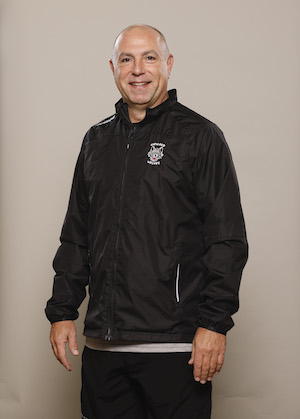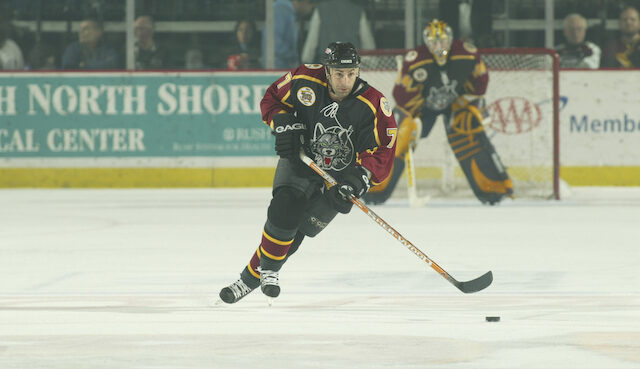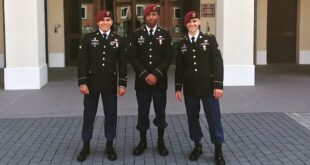A premier defenseman on both sides of the Atlantic for more than a decade, Bob Nardella is continuing his stellar run in professional hockey as an assistant coach with the stateside team that gave him his start.
After decades as a standout hockey defenseman and accomplished assistant coach, as well as more than 20 years as the owner of his own business, Bob Nardella has concluded that the surest path to success is as a team player.
“It doesn’t matter if you’re a janitor or a VIP executive — you have to work together to be successful,” says the 53-year-old, who was inducted into the National Italian American Sports Hall of Fame in December.
Nardella spent the majority of his career with the Chicago Wolves of the American Hockey League, the sport’s highest-level minor league, and played for Italy’s national hockey team in three world championships and two Olympic Games.
He ranks second on the Wolves’ all-time regular-season list in games (476), fifth in assists (239) and sixth in points (298). He was a key player when the team seized the 1998 and 2000 Turner Cups — when it was part of the now-defunct International Hockey League — as well as the 2002 Calder Cup.
 As an assistant coach, he has helped lead the Wolves to four of the last five Central Division crowns as well as the 2019 Calder Cup finals.
As an assistant coach, he has helped lead the Wolves to four of the last five Central Division crowns as well as the 2019 Calder Cup finals.
Nardella lives in Rosemont, Illinois, also home to the Allstate Arena, where the Wolves play their home games. He grew up half an hour away, in Melrose Park, where his pride in his Italian background was reinforced by his parents, grandparents and the western suburbs’ deeply rooted Italian-American community.
“When I am in the U.S., I am Italian, and when I am in Italy, I am American,” he muses. “It’s ironic. That’s just how it is.”
Nardella, who was inducted into the Illinois Hockey Hall of Fame in 2012, started playing hockey at a very young age. His father, a former player and huge hockey fan, gave him his first stick, and the young boy followed the examples set by his four older cousins, who all participated in the sport.
He began playing competitively as a youth, with his parents making financial sacrifices to afford the equipment and traveling costs, he recounts. His father, a police officer, supplemented his income with jobs like racetrack teller, plumber and gas station attendant.
Nardella studied criminal justice at Ferris State University in Grand Rapids, Michigan. After his third year in college, he moved to Europe to play three seasons with two different hockey teams in Northern Italy.
“I was in these small towns, and people didn’t really speak English,” he recalls. “My roommate was from Canada, and his parents were immigrants from Italy, so he really helped with the language. He put Post-it notes all over the apartment.”
After making a name for himself in the Italian league, Nardella debuted with the Wolves during the team’s inaugural season in 1994-95.
The experience was “tremendous,” he says. “For the first home game in the franchise’s history, there were 16,000-plus people. It was very loud. You could sense the energy, the excitement, the anticipation.”
Nardella, who stands 5-foot-7, was undersized for a defenseman back then. In fact, “I got listed as 5-foot-9 a lot. It was a little bit of a fib,” he admits.
His strengths were his passing game and his ability to see plays. “I was more offensive-minded,” he says. “Almost 95 percent of players were bigger and weighed more than me, by 3-4 inches and 40-60 pounds, so I had to learn to use my mind to be successful and effective.”
After his first season with the Wolves, he went back to play in Italy for a year, then spent a year playing in Germany. “I got paid a lot more money to play there than I was going to make here,” he explains.
He came back to the Wolves in 1997 after a change in management, when coach Gene Ubriaco took over temporarily as general manager. Nardella stayed with the team until 2002 and got to be part of its first championship win. He even made the assist for the winning goal in Game 7.
“When the puck went in, I’ll never forget how loud that place was” he says. “It’s my most memorable win, that’s for sure.”
In a profession where most players retire by their early 30s, Nardella says he was lucky to play until age 38. He gives much of the credit to his wife, Alicia, whom he met in Iowa, where he played junior jockey when both were teenagers.
“Having a spouse that could help you become successful — you can ask any athlete, it’s really, really big. It’s everything, really.”
The couple have two sons, Bobby and Nicholas, both of whom followed in their father’s footsteps. Bobby is a defenseman in the National Hockey League’s Washington Capitals system, and Nicholas plays hockey for the NCAA’s Division I Michigan Technological University.
Nardella has owned an industrial cleaning products company since 1998. He tried to retire from hockey a few times, but every time the game called him back, he says.
The first time he retired was in 2002, when “things weren’t going so great” because the Wolves wanted younger players to develop, he says. So he and his family went to Milan, Italy, where he played for three months for a team that won the Serie A championship.
After the family returned stateside, Nardella got a call to play for the IceHogs out of Rockford, Illinois. “I am trying to get my business going, trying to coach my son with his hockey, and I just don’t have time to go practice in Rockford every day,” he says. So the team told him he only had to show up for games, no practice necessary, and he accepted the offer.
“I did really well there, and the Wolves ended up calling me again to finish the season with them,” he recalls.
Nardella didn’t play the following year, and then got the call to play for Italy in the 2006 Winter Olympics held in Torino, Italy.
“I was 37. I hadn’t played in a year. I was trying to do my business. I was a hockey director (for a youth league) in charge of 13 teams, and coaching one of them. I was quite busy.”
But he’d already played for the Italian Olympic team in 1998 in Nagano, Japan, and wasn’t about to turn down the offer, however unexpected.
His first Olympic experience was amazing, Nardella says, including meeting his longtime idol, Canadian great Wayne Gretzky, who was executive director of Canada’s men’s hockey team.
He shared his second Olympic adventure with his wife and sons, who accompanied him to Italy. At last, he finally had the chance to take part in the opening ceremony, which he didn’t get to do in 1998 because the Italian team had a match that day.
Participating in such a magical, world-televised event was “surreal,” he says. It was also a bit embarrassing, he recalls, laughing, because he and a teammate found themselves lagging behind by about 60 meters, with millions watching on TV.
Once back in the United States, Nardella was asked by the Wolves to play for a couple of months until the end of the season, after which came his once-and-for-all retirement in 2006.
His playing days behind him, Nardella focused on running his business and coaching his sons’ youth hockey teams until both aged out. He also started coaching for the Wolves, first as a part-time assistant, then as skills development coach and finally as assistant coach, with his latest promotion in July 2017.
His philosophy is that winning matters a lot, but giving it your best matters most, he says.
“A lot of these players (in the AHL) are very young, in their early 20s. They are learning still, so it’s still a constant teaching,” he says. “You’ll get older players that come through, and they get it right away because they are seasoned professionals. And the skill level of the professionals is much higher also.”
“My role is to be supportive,” he continues, “and enforce what we are trying to accomplish by teaching and showing video.”
As for whether he’d ever want to be a head coach, “I would never say never, but I have not pursued that at all,” he answers. He likely would have to move elsewhere, he adds.
“When I played, it was about me. Now, it’s about them (my family). We do just fine where we are, and we love where we live.”
Like most budding hockey players, his dream in his youth was to play in the National Hockey League. In his eyes, it didn’t happen because he simply wasn’t good enough. However, he’s been told that if he were playing today, he’d have made the NHL because it’s much more common to have players with a smaller build, like his, in the top league.
In the end, the speculation doesn’t matter, he says, because looking back, he feels his experience has been priceless.
“I played 14 seasons of professional hockey, and I was on seven championship teams. That’s a pretty good winning percentage,” Nardella says. “If you were to tell me when I was 15 years old that I would have accomplished what I have accomplished, I probably would not have believed you.”
The above appears in the January 2022 issue of the print version of Fra Noi. Our gorgeous, monthly magazine contains a veritable feast of news and views, profiles and features, entertainment and culture. To subscribe, click here.
 Fra Noi Embrace Your Inner Italian
Fra Noi Embrace Your Inner Italian







